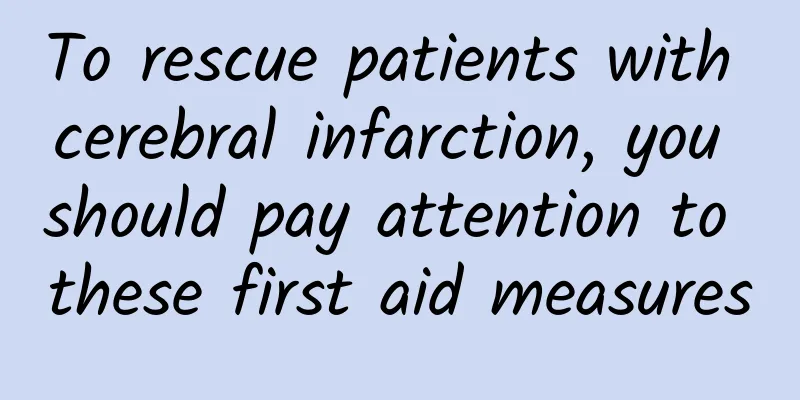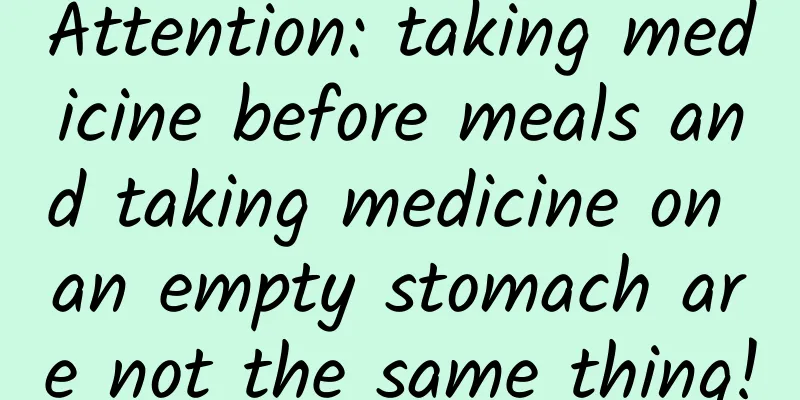To rescue patients with cerebral infarction, you should pay attention to these first aid measures

|
Cerebral infarction, also known as "stroke" or "cerebral infarction", is a sudden, extremely fatal acute cerebrovascular disease. It often occurs without warning, catching patients and their families off guard. However, cerebral infarction is not completely untreatable. Whether the rescue is timely and whether the first aid method is appropriate directly affects the patient's life safety and subsequent recovery. Today, we will use easy-to-understand methods to popularize the first aid measures for cerebral infarction to help everyone fight for life at critical moments. 1. The "golden time" for cerebral infarction: one minute earlier, one minute less dangerous When treating patients with cerebral infarction, there is a key concept that must be kept in mind, that is, the "golden time for treatment". Cerebral infarction occurs due to blocked blood vessels, resulting in insufficient blood supply to the brain. Brain cells are extremely sensitive to lack of oxygen. After more than 3-4 hours, a large number of brain cells will begin to die irreversibly. Therefore, the professional medical community calls the 4.5 hours after a stroke the "golden time window". If effective measures can be taken during this period, such as thrombolytic therapy or unblocking blood vessels, the patient's chance of recovery will be greatly improved. But to seize this period of time, we need to be able to quickly identify the symptoms of cerebral infarction and take correct first aid methods. 2. How to quickly identify cerebral infarction? The early symptoms of cerebral infarction are often sudden, so many people think they are just ordinary discomfort, which leads to delayed treatment. The following are common manifestations of cerebral infarction. Knowing these signals can help you make accurate judgments at critical moments: 1. Asymmetric facial expressions : Patients may experience weakness in facial muscles on one side, and the corner of their mouth may be crooked when they smile. 2. Limb weakness or numbness : One side of the patient's arm or leg suddenly becomes weak or even completely unable to move. 3. Difficulty in language expression : Patients may speak unclearly, fail to express their ideas clearly, or be unable to understand what others say. 4. Sudden vision problems : Sudden blurring or loss of vision in one or both eyes. 5. Dizziness or loss of balance : The patient may feel dizzy, unable to stand, or even fall suddenly. Remember these simple judgment formulas for symptoms - "FAST" : Face, Arm, Speech, Time . If the patient has similar symptoms, emergency measures must be taken immediately and an emergency number must be called. 3. Key steps for emergency treatment of patients with cerebral infarction When someone around you is suspected of having a stroke, as a bystander or family member, the most important thing is to stay calm and take correct first aid measures before the ambulance arrives. The following steps can help you better deal with this emergency: 1. Call emergency number immediately Time is the lifeline for patients with cerebral infarction. If you find that a patient has symptoms of cerebral infarction, you should call the emergency number immediately and inform the rescuers of the patient's specific situation. The more accurate the description, the more targeted the measures taken by the rescuers after they arrive. For example, explain the patient's symptoms, the time of onset, and whether there is a history of previous diseases. 2. Place the patient to avoid further harm While waiting for the ambulance to arrive, lay the patient flat on a stable ground or bed, with the head slightly elevated and the neck not bent. This position helps reduce blood pressure in the brain and prevents vomitus from being inhaled into the airway and causing suffocation. Remember not to shake the patient or force him to stand and walk, as this may aggravate the condition. 3. Observe the patient's breathing Cerebral infarction may cause the patient to become confused or even comatose, so it is necessary to observe whether the patient's breathing is normal. If the patient's breathing is weak or even stopped, cardiopulmonary resuscitation (CPR) can be performed, but before specific rescue, it is best to make sure that professional medical personnel have been called and strictly follow the instructions of the emergency personnel. 4. Do not feed or give water to the patient Patients with cerebral infarction may have difficulty swallowing. If they are force-fed or given water, food or liquid may enter the airway, causing suffocation or aspiration pneumonia. Even if the patient is extremely thirsty, they should wait until professional emergency personnel arrive before deciding whether to replenish water. 5. Avoid self-medication Some family members may think of giving patients aspirin or other drugs in a panic to try to "thin the blood" or "relieve the condition." However, there are different types of cerebral infarction, such as ischemic cerebral infarction and hemorrhagic stroke, and the treatment methods for the two are completely different. If the patient has a hemorrhagic stroke, taking aspirin will increase the risk of bleeding. Therefore, do not take medication without a doctor's diagnosis. 6. Record the time of onset It is very important to record the time when the patient's symptoms appeared. This is the key basis for doctors to judge the treatment plan, because some drugs (such as thrombolytic drugs) are only effective if taken within 4.5 hours after the onset of symptoms. Clearly telling emergency personnel or doctors the time of the patient's onset can buy precious time for treatment. Conclusion Rescue of cerebral infarction is a race against time, and timely first aid measures are the guardian of the patient's life. By understanding and mastering the correct first aid knowledge, you can not only strive for more life for patients in critical moments, but also provide more effective help to family and friends. Cerebral infarction is not completely inevitable, and a healthy lifestyle is the best "line of defense". Let us start from today to care for our bodies, pay attention to daily health management, and lay a solid foundation for staying away from cerebral infarction. At the same time, I hope that these first aid knowledge can help more people and become the hands that protect lives in critical moments. Author: Chen Ling, Lishui Second People's Hospital |
<<: Here are all the things you want to know about hallux valgus!
>>: Master the 7 "self-healing switches" to activate the body's "self-healing power"!
Recommend
Lump under the nipple
If you feel a lump under the nipple, you must fir...
This kind of fleshy lump in the stomach may turn into colon cancer! Check it out as soon as possible at this age...
Advice to friends over 40 years old Include colon...
What does polycystic changes in the right ovary mean?
When women have their bodies checked by B-ultraso...
Remedies for sleeping in bed during menstruation
It is very normal for men and women to have sex, ...
What are the benefits of soaking black beans in vinegar? The correct way to soak black beans in vinegar
Black beans are a common food in daily life, whic...
What are some quick ways for women to get rid of dampness and detoxify?
As we all know, there are six evil spirits in the...
What are the reasons for women's irregular menstruation?
Irregular menstruation in women refers to the sym...
Can I drink yogurt when I'm pregnant?
Pregnant women must be very careful about their d...
Pregnancy test paper picture
In the past, women had to go to the hospital for ...
What is pregnancy chromosome test?
Chromosome examination after pregnancy is a parti...
What are the effects of sex during early pregnancy?
Some couples still have sex in the early stages o...
How long does it take for the scab to fall off after cesarean section?
Many female friends choose cesarean section when ...
Polyps in the vagina
Many women will find that they have polyps in the...
The fastest way to know if you are pregnant
The way to confirm that you are pregnant is very ...









